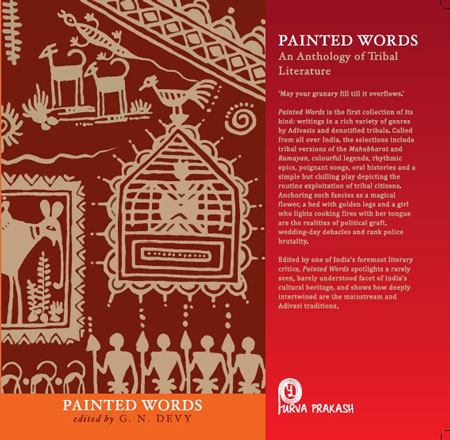All languages created by human communities are our collective cultural heritage. Therefore, it is our collective responsibility to ensure that they do not face the global phonocide let loose in our time. | Read or download the full lecture here >>

Tribal Literature by G.N. Devy >>
Free eBooks & Magazine: Adivasi literature and languages >>
This lecture was delivered by Prof. Ganesh N. Devy as part of a national consultation on ‘Education among Adivasis/Tribals’ held at NIAS (September 26-28th, 2010) under the ‘Education Portfolio’. The ‘Education Portfolio’ is supported by the Dorabji Tata Trust, Mumbai and its activities focus on conducting research related to issues of education at all levels. Research under the ‘Platform for Education Policy’ focuses on reviewing and assessing various policies at the central and state levels, while the ‘Curriculum Exchange Network’ focuses on developing and fostering debates and sharing of curricula for various subjects and disciplines.
Find scholarly books, poetry and fiction relating to tribal culture – Indian publishers
List of sites covered by this Google custom search engine
To find children’s and educational books or search Indian periodicals, magazines, web portals and other sources safely, click here >>
Search tips
Combine the name of any particular state, language or region with that of any tribal (Adivasi) community.
Add keywords of special interest (music, poetry, dance just as health, sacred grove and biodiversity); learn about the rights of Scheduled Tribes such as the “Forest Rights Act” (FRA); and the United Nations “Declaration on the Rights of Indigenous Peoples”, “Universal Declaration of Human Rights”, “women’s rights”, or “children’s right to education”.
Ask a question that includes “tribal” or “Adivasi”, for instance: “Adivasi way of life better?” (or “tribal way of life worse?”)
Specify any particular issue or news item (biodiversity, bonded labour and human trafficking, climate change, ecology, economic development, ethnobotany, ethnomedicine, global warming, hunter-gatherers in a particular region or state, prevention of rural poverty, water access).
For official figures include “scheduled tribe ST” along with a union state or region: e.g. “Chhattisgarh ST community”, “Himalayan tribe”, “Scheduled tribe Tamil Nadu census”, “ST Kerala census”, “Particularly Vulnerable Tribal Group Jharkhand”, “PVTG Rajasthan”, “Adivasi ST Kerala”, “Adibasi ST West Bengal” etc.
In case the Google Custom Search window is not displayed here try the following: (1) toggle between “Reader” and regular viewing; (2) in your browser’s Security settings select “Enable JavaScript” | More tips >>
Note: hyperlinks and quotes are meant for fact-checking and information purposes only | Disclaimer >>